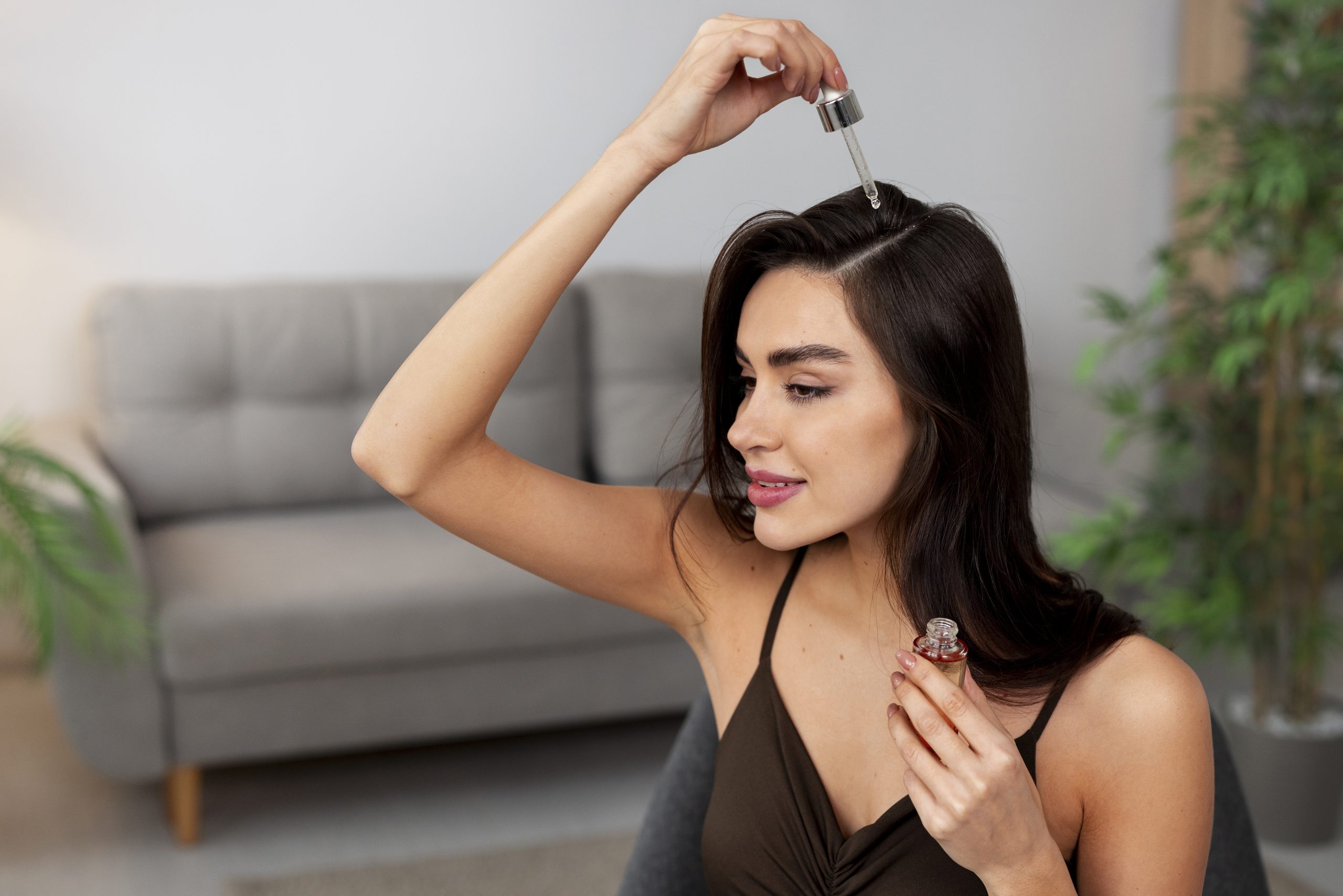
Learn about beauty and skincare with our expert guide.

Hair oil has been used for centuries to nourish, strengthen, and protect hair. From ancient Ayurvedic treatments to modern-day hair care routines, oils are crucial in maintaining healthy locks. Whether you want to boost hair growth, combat dandruff, or add shine, there’s a perfect hair oil. In this ultimate guide, we’ll explore the Benefits of hair oil, the oily hair guide benefit uses greasy hair you the resolution of all your hair problems.
Hair oils make the scalp healthy. It provides a natural way to strengthen hair roots and protect against damage. Here are some main benefits: Oily Hair Guide Benefits Uses of Greasy Hair
Hair oil shines in hair. After washing, we see the hair remains too soft. It keeps the scalp hydrated for a long time, keeping hair well moisturized and soft. It helps reduce dryness, breakage, and split ends.
Some oils, like castor and rosemary oil, improve blood circulation to the scalp, increase the growth of hair follicles, and promote faster hair growth. Rosemary oil activates brain cells, hence improving cognition, reducing pain, and relieving stress.
Some oils are rich in fatty acids and vitamins, for example, jojoba oil and banana oil. Jojoba oil helps make dull hair soft and restore its shine. Batana oil replenishes damaged hair and brings it softness.
Tea tree, neem, and coconut oil have antibacterial properties that help eliminate dandruff, itching, and scalp infections. Tea tree oil helps unclog hair follicles and nourishes the root; neem oil is full of antioxidants that stop the process of hair fall.
Hair oils help protect against UV rays, pollution, and heat damage, reducing the harm inflicted and dryness.
Infusing the hair with natural oils smooths the cuticle, lowering frizz and adding brilliant gloss.

Choose an oil that suits your hair type and concern (this will be elaborated in the next section).
If you warm up the oil slightly before using it, it helps with absorption and stimulates the scalp.
Apply oil on the scalp and use your fingers to do circular motions. This helps facilitate blood flow and aids even distribution.
Focusing on the ends, apply oil to the rest of the hair and ensure the oil is spread evenly throughout.
For deep conditioning, leave overnight and wash in the morning.
For quick nourishment, leave for 1-2 hours before shampooing.
A good sulfate-free shampoo will remove excess oil without stripping hair of its essential moisture.
Oiling hair has many benefits, including restoring its health and shine. However, too much oil can clog pores, so oiling your hair 2-3 times a week is a good idea.

Castor oil—This oil is rich in ricinoleic acid, which helps with hair growth
Rosemary Oil – Enhances blood circulation in the scalp and fortifies the roots of one’s hair.
Amla Oil—This oil contains Vitamin C, which helps prevent hair loss and promote hair growth.
Argan Oil—This oil helps retain moisture, diminish frizz, and enhance hair’s glory.
Almond Oil—Works wonders on dry hair, softening it.
Olive Oil – This oil goes deep into the hair and ensures proper nourishment and hydration
Tea Tree Oil—This oil contains antifungal and antibacterial properties, which help treat dandruff and scalp infections.
Neem Oil – Cools down an itchy and flaky scalp.
Coconut Oil– Prevents dryness on the scalp and provides good moisturization.
Jojoba Oil – It helps balance oil in the hair and does not let it become greasy.
Grapeseed Oil—A thin oil that soaks into the hair quickly.
Peppermint oil—It is good for a refreshed scalp and controlling excess oil.
Bhringraj Oil: it helps strengthen hair roots while reducing hair fall.
Sesame oil: Known to be rich in nutrients, it supports healthy hair growth.
Onion oil: It has been proven to significantly improve blood circulation in the scalp and help strengthen the hair follicles.
Myth: Oiling hair daily helps improve the overall quality of hair.
Truth: Daily oiling can block the pores on your scalp and lead to dandruff. You should limit your oil usage to 2-3 times a week.
Myth: Oil should only be applied to the scalp.
Truth: Most of the benefits are on the scalp, but putting oil on the hair strands helps prevent split ends or dryness.
Myth: The more oil, the better.
Truth: Too much oil will make it increasingly difficult to wash off, resulting in greasy hair.
✔ Use cold-pressed oil, as they have the most health benefits.
✔ Make sure you massage the oil in your head for a minimum of 5 to 10 minutes.
✔ If you will use an oil for the first time, make sure to do a patch test first to check if you’re allergic to it.
✔ Avoid suffocating yourself with a towel or a cap before sleeping to shield your pillow from the oil.
Hair oils are scientifically observed to be extremely effective in facilitating and maintaining shiny, smooth, and healthy hair.
Selecting the correct oil matched to your concerns can elevate your hair care regimen and improve the condition of your scalp. If you have problems with hair fall, dandruff, or even dryness, there is an oil tailored just for you. Integrate oil into your daily hair care practices, and watch your hair’s strength, growth, and shine improve dramatically oily hair guide benefit uses greasy hair
Most Common Questions About Hair Oil
Using hair oil helps increase nourishment and strength, prevent dry hair, breakage, and split ends, aid in healthy growth and maintenance, and promote a healthy scalp, which reduces dandruff and irritation.
Best known for promoting hair growth through improved blood circulation and absorption in the scalp, hair oils like coconut, castor, and rosemary oil are great for hair advancement.
Depending on your hair type, oil should be applied at different frequencies: • Normal hair—1-2 times a week • Oily hair—once a week • Dry hair—2-3 times a week
For best outcomes, massage oil when hair is just slightly damp, which helps aid penetration. When hair is soaked, it won’t absorb properly, so no oil should be applied.
The longer the oil is allowed to stay on, the deeper the nourishment. That said, it is not recommended for those with sensitive scalps; washing after 1-2 hours should suffice.
Correct, anti-dandruff oils like tea tree oil, neem oil, and coconut oil possess antifungal activities that help alleviate flakes and scalp irritation.
7. Can hair oil make my hair greasy?
Not washing hair properly or applying too much oil can result in greasiness. To prevent excess grease, use a small amount and shampoo thoroughly.
8. What is the best way to apply hair oil?
1️⃣ Warm the oil a bit to improve absorption.
2️⃣ Massage the oil into your scalp with circular motions.
3️⃣ Spread it through the length of your hair.
4️⃣ Let it sit for at least 1-2 hours before washing.
9. Are there any side effects of using hair oil?
Safe natural hair oil options exist, but the wrong type can build up excess oil, clog pores, or cause skin irritation. As with any new product, it’s wise to do a patch test.
10. Can I mix different oils for better results?
Of course! Blending oils such as coconut and castor oil for hair growth or olive and argan oil for conditioning can provide improved results.
Best Hair Oil for Your Hair Type; Visit Here
No comments yet. Be the first to comment!
You must be logged in to post a comment.

Recent Comments